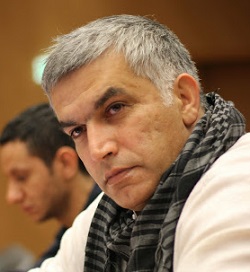16 October 2014 – Washington, D.C. – On 14 October, 20 civil society organizations sent a letter to United States Secretary of State John Kerry expressing their deep concern over the recent arrest of prominent Bahraini human rights activist Nabeel Rajab. In the letter, the signatories urge Secretary Kerry and the U.S. Department of State to “publicly press the Government of Bahrain to drop all charges against Mr. Nabeel Rajab and to release him immediately.”
Please continue reading for the full text of the letter
Dear Mr. Secretary:
We write to urge the U.S. Department of State to publicly press the Government of Bahrain to drop all charges against Mr. Nabeel Rajab and to release him immediately. Mr. Rajab was arrested on October 1, 2014 after returning to Bahrain after two months traveling through Europe, advocating for human rights and democratic reforms. Amnesty International has reviewed Nabeel Rajab’s statements on Twitter and has declared him a prisoner of conscience, detained solely for the peaceful exercise of his right to freedom of expression.
Mr. Rajab, president of the Bahrain Center for Human Rights (BCHR) and co-director of the Gulf Center for Human Rights (GCHR), is an internationally respected human rights defender who has worked tirelessly on behalf of the rights of his fellow Bahraini citizens.
Mr. Rajab received a written summons to appear at the Electronic Crimes Unit of the Criminal Investigation Directorate in Manama on October 1, 2014. While there, interrogators questioned him about two comments he had made on social media in which he criticized the Bahraini government for using counterterrorism laws to prosecute human rights defenders and accused Bahraini security forces of fostering violent beliefs akin to those of the Islamic State armed group. The government then charged him with violating article 216 of Bahrain’s penal code, which prohibits offending public institutions. On October 9, the public prosecutor scheduled the first hearing of his trial for October 19.
Bahraini authorities have previously prosecuted Mr. Rajab on charges that violate the right to freedom of expression. He was detained from May 5 to May 28, 2012, for remarks on Twitter criticizing the Interior Ministry for failing to investigate attacks against Shi’a in Bahrain by what Mr. Rajab alleged were pro-government gangs. On June 28, 2012, a criminal court fined him 300 Bahraini Dinars (US$790) in that case.
Authorities again detained Mr. Rajab on June 6, 2012, for another remark on Twitter, in which he called for Prime Minister Khalifa bin Salman al-Khalifa to step down. On July 9, 2012, a criminal court convicted and sentenced him to three months in prison on that charge. A court of appeal overturned that verdict, but in a separate case a criminal court sentenced him to three years in prison for organizing and participating in three demonstrations between January and March 2012. The authorities presented no evidence that Mr. Rajab advocated for or engaged in violence. Mr. Rajab was released on May 24, 2014, after serving two years in prison.
In addition to Mr. Rajab, 13 high-profile activists remain in jail on charges that relate exclusively to their participation in peaceful anti-government protests in 2011 and their calls for political reform in Bahrain. Mr. Secretary, as we are sure you will appreciate, the political accommodation that the U.S. government wishes to see in Bahrain is precluded by the authorities’ continuing persecution of peaceful advocates for reform such as Nabeel Rajab, and the human rights conditions in Bahrain continue to deteriorate as a result.
While we appreciate the U.S. State Department’s expressed “[concern at] the Government of Bahrain’s detention of human rights activist Nabeel Rajab,” the State Department must clearly and publicly call for Mr. Rajab’s immediate and unconditional release. In accordance with President Obama’s recent memorandum on civil society, we encourage you to make further high-level statements and urge the government of Bahrain to stop violating human rights as part of a larger effort to oppose the actions of foreign governments that restrict freedoms in contravention of their international obligations. The administration must apply this policy to protect the space for civil society to operate freely in Bahrain; the case of Nabeel Rajab is a key test for the President’s newly-announced policy.
The arbitrary arrest and detention of human rights defenders such as Mr. Rajab contradicts the Kingdom of Bahrain’s claimed commitments to reform and reconciliation. We urge you to publicly call for the immediate release of Mr. Nabeel Rajab, in order to help build confidence across Bahraini society and to create an environment for meaningful dialogue necessary to resolve the ongoing crisis.
Sincerely,
Americans for Democracy and Human Rights in Bahrain Bahrain Center for Human Rights Bahrain Institute for Rights and Democracy (BIRD) Freedom House Human Rights Watch Human Rights First Amnesty International USA Project on Middle East Democracy (POMED) Campaign for Peace and Democracy The Center for Inquiry Church of Scientology National Affairs Office CIVICUS: World Alliance for Citizen Participation Friends Committee on National Legislation Human Rights Law Foundation Just Foreign Policy MENA Solidarity Network-US National Lawyers Guild The Russian Orthodox Autonomous Church of America Shia Rights Watch Universal Muslim Association of America (UMAA)




